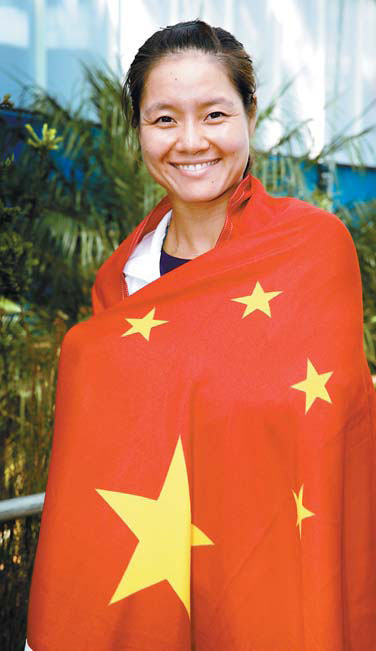Li holds key to future of tennis
Forget Serena Williams and Maria Sharapova: China's Li Na is regarded as the hottest property in tennis, not just because of her ability, but because she is opening the door to the sport's future.
In becoming Asia's first Grand Slam champion at the 2011 French Open, the wise-cracking Chinese star brought tennis to a huge potential new audience, including 1.3 billion of her compatriots and a region encompassing two-thirds of humanity.
Women's Tennis Association chief Stacey Allaster has put Li, 31, front and center of a concerted push into Asia, including multiple new tournaments in China and the end-of-season championships in Singapore.
|
Li Na poses with a Chinese flag at the Australian Open in Melbourne on Friday. Fiona Hamilton / Associated Press |
In September, Li's home city of Wuhan will host a new, premier-level tournament, one of six WTA events on Chinese soil this year.
Li was the cover girl for last year's Time magazine issue rating the world's 100 most influential people, and she is listed by Forbes as the planet's second highest-earning female athlete behind Sharapova.
After a fallow period following the 2011 French Open victory, when the distractions of sponsors and media drove her off her game, Li has been reborn since teaming with coach Carlos Rodriguez in 2012.
Heading towards her 32nd birthday next month, Li finished last season at world No 3, the highest by an Asian player, and contested the final of the eight-player season climax, the WTA Championships in Turkey. In Melbourne, she reached her third Australian Open final.
Much has been made of her brave and career-defining decision to opt out of China's state sports system and go it alone, hiring her own coaches and controlling more of her winnings.
Often seen as a maverick, she also defied Chinese convention by getting a tattoo of a red rose on her chest and ditching her husband, Jiang Shan, as her coach in favor of Rodriguez.
She credits the move with not only resurrecting her career, but saving her marriage.
The Chinese system initially groomed Li for badminton, following in the footsteps of her father, who was a successful player. But she was switched to tennis, against her wishes, at the age of nine.
"At the time, tennis was not so popular in China. After my family saw the court, they said, 'OK, we'll change'. I was like, 'why didn't you ask me?'" she recalled later.
Li's father passed away when she was 14, and she briefly gave up tennis in her early twenties to study journalism, frustrated by her inability to reach the main draw of Grand Slams.
But a plea to play in a national competition reignited her passion for the game and she became part of the vanguard of Chinese women's players who broke new ground over the past decade.
In 2004, she became the first Chinese woman to win a WTA title, in Guangzhou, and later she was the first to reach a Grand Slam quarter-final, in 2006 at Wimbledon, and the first Chinese player to break into the world's top 10.



















